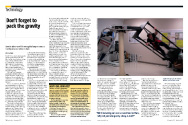Going to Mars? Don’t forget to pack gravity

Floating around in microgravity inside a spacecraft might look like fun, but it can do nasty things to your body. With the current enthusiasm for crewed space flight and particularly NASA’s plan to send astronauts to Mars, there is a need to find ways to counteract the damaging effects of a lack of gravity.
Without Earth’s gravity, astronauts lose their hand-eye coordination and as the days go by they suffer a steady loss of red blood cells and deterioration of bones and muscle, including the heart.
Back on Earth it can take weeks for an astronaut to re-adapt to terrestrial gravity, and they risk broken bones and torn muscles for much longer. “The body tries to adapt itself to a free-fall environment, and this creates enormous problems on return to gravity,” says Kevin Fong of the Centre for Aviation, Space and Extreme Environment Medicine at University College London.
The answer, space scientists increasingly believe, is to create artificial gravity in orbit. “We’ll be taking our own air, food, heat and light to Mars. Why not just take gravity along with us as well?” says Fong.